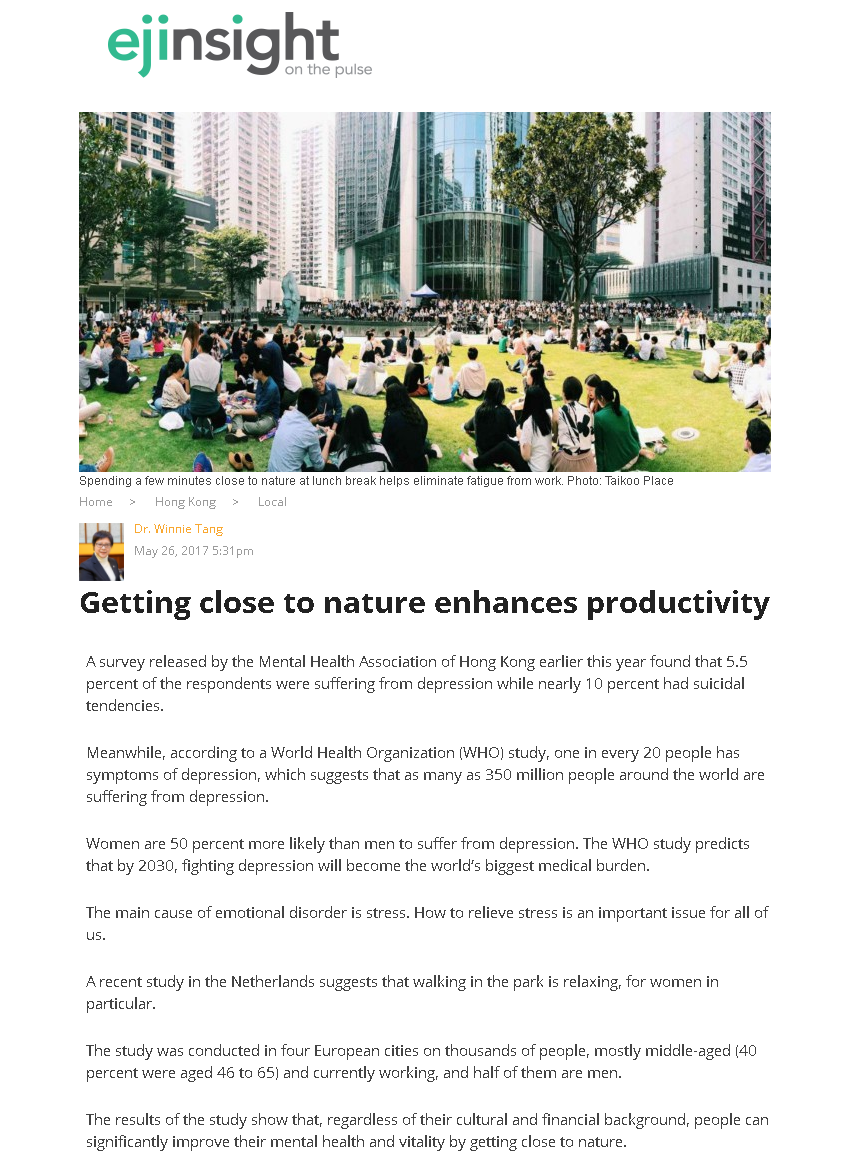網上版請按此

Getting close to nature enhances productivity
A survey released by the Mental Health Association of Hong Kong earlier this year found that 5.5 percent of the respondents were suffering from depression while nearly 10 percent had suicidal tendencies.
Meanwhile, according to a World Health Organization (WHO) study, one in every 20 people has symptoms of depression, which suggests that as many as 350 million people around the world are suffering from depression.
Women are 50 percent more likely than men to suffer from depression. The WHO study predicts that by 2030, fighting depression will become the world's biggest medical burden.
The main cause of emotional disorder is stress. How to relieve stress is an important issue for all of us.
A recent study in the Netherlands suggests that walking in the park is relaxing, for women in particular.
The study was conducted in four European cities on thousands of people, mostly middle-aged (40 percent were aged 46 to 65) and currently working, and half of them are men.
The results of the study show that, regardless of their cultural and financial background, people can significantly improve their mental health and vitality by getting close to nature.
Researchers from the University of Tampere in Finland also found that park walks at lunchtime can reduce fatigue from work. The study was published in January in the Journal of Occupational Health Psychology.
About 100 workers from different fields working mainly in “knowledge-intensive and emotionally demanding jobs” were recruited.
They were surveyed about their normal lunch break routines before telling them to change what they did during that period for 10 consecutive working days.
Instead of spending the whole lunch break chitchatting with colleagues or friends, they were asked to take a quick lunch, then half of them took 15 minutes of leisure walk at a nearby park and focused on the natural sounds and green environment, while the other group had to find a quiet place in the office to do 15-minute exercises, e.g., deep breathing and mindfulness techniques.
As a result, people in both groups felt their concentration improved with less strain and higher wellbeing during the days when they walked and relaxed during their break, compared with the days they followed their normal lunch routines.
The group who walked in the park at lunchtime was particularly pleased with their breaks, felt higher levels of enjoyment, showed more concentration in their work, and experienced less fatigue.
What's more, the effects lasted until the end of the working day, and they left work with more energy.
In other words, walking in the park during lunch break could benefit the worker's personal and social life.
It may be difficult for busy city dwellers to access this type of restorative environment during their lunch break. Relaxation exercises inside their office may be easier to fit in on a regular basis.
For those who think they are too busy for a 15-minute intermission, the researcher suggests that “time lost might be made up by higher afternoon efficiency”.
In other words, people would be more productive after the lunchtime recovery.
Getting close to nature would have a better effect in relieving stress than going shopping.
The Conservation E3 Foundation is launching a Tree Adoption Program, an online interactive platform, to encourage people, the generation in particular, to understand nature through a tree investigative tour. The tour will also help them relieve stress and improve their wellbeing.
Dr. Winnie Tang
Founder and Chairman of the Conservation E3 Foundation